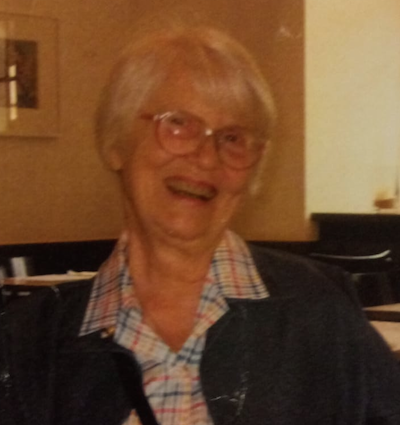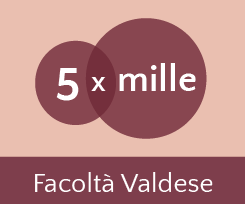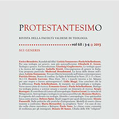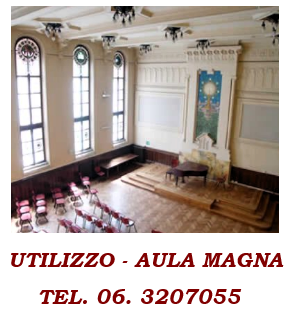Login
- News Archive
- La letteratura del Nuovo Testamento
- Fulvio Ferrario: L'etica di D. Bonhoeffer
- Esami e corsi del secondo semestre
- Sessione di studi su Identità e Appartenenza
- Ermeneutica femminista, con M.Bachmann
- Francois Vouga: l'invenzione della cristologia
- Leggere oggi l'Esodo - D. Garrone a Torino 28/3/15
- 21-24 aprile Cristologia e Gnosi
- 5xmille
- Programma corso di laurea in Teologia e Laurea Specialistica in Teologia a.a. 2015 2016
- 25 maggio - Giornata di studi di genere - Rappresentazioni dell'altro/a Costruzione del mostro
- 6 - 8 maggio: 3 lezioni della Prof.ssa Jutta Hausmann "In te saranno benedette tutte le famiglie della terra" (Gen 12,3)
- 8 - 10 giugno: Convegno internazionale "Campagne legate alle indulgenze nel tardo medioevo. Martin Lutero e il dibattito del 1517"
- Sessione di studi intensivi 25-26 settembre 2015 - scheda di iscrizione
- laurea in scienze bibliche e teologiche immatricolazione 2015-2016
- Prolusione a.a. 2015 - 2016
- LAUREA SBT CALENDARIO ESAMI 1° SEMESTRE A.A. 15-16
- Prof. Daniele Garrone
- Discussione tesi di Laurea specialistica in teologia 20 ottobre ore 15.00 - 17.00
- CORSO DI ECUMENISMO A BOLOGNA
- GAJEWSKI TOMASSONE MANNA A MILANO
- INCONTRO DI FORMAZIONE A NAPOLI. Spiritualità e vissuto quotidiano
- Discussione tesi di Laurea specialistica in teologia 11 novembre ore 16.45
- Corso del Prof. Dr. Hans Martin Barth dal 9 al 20 novembre 2015
- Theology in '900
- Seminari LSBT a Messina e Catania 14-11-15
- LSBT MODIFICHE AL CALENDARIO ESAMI!
- 3 seminari a Milano 16/23/30-01-16 con esami
- Dal 7 al 13 gennaio 2016 - I Discorsi di addio di Gesù ai suoi discepoli nel contesto dell'ultima cena - Prof. Dr. Jens Schröeter
- LSBT calendario esami/tesi II semestre 2017-2018 aggiornato.
- Milano: Studi di genere e teologie femministe
- Corso base di Pastorale Clinica 3a ed., con Sergio Manna
- Come studiare - Come scrivere: metodi e capacità
- Paolo e le sue lettere: una teologia in costruzione
- Giubileo della Riforma, conferenze a Torino
- Laboratorio "fede e psicologia"
- Giornata di studi femministi
- viapietro cossa42
- Inaugurati i corsi tematici di approfondimento teologico
- Prof. Lubomir Žák - 15 e 22 aprile 2016 La disputa "De homine" di Lutero
- Prof. Daniele Garrone e Prof. Martin Walraff - 14 aprile 2016: Verso il cinquecentenario della Riforma
- Forum "Religioni e politica" sulla "post-secolarizzazione
- Dal 4 al 12 maggio corso del Prof. Dr. Michael Wolter: "la dottrina della giustificazione secondo l'apostolo Paolo"
- Seminari di lettura, esegesi e teologia biblica a Torino
- 31 maggio 2016 ore 17.30 - Prof. Paolo Ricca - Educazione e pace nel pensiero e nell'azione di Tullio Vinay
- Sessioni luglio / ottobre - seduta tesi ottobre 2016
- master
- Daniel Boyarin Lunedì 27 giugno 2016 ore 18.15
- Esegesi, formazione, intercultura, omaggio al Prof. Yann Redalié
- viapietrocossa42 giugno 2016
- Catalogo corsi 2016-2017
- LABORATORIO "FEDE E PSICOLOGIA" 2A EDIZIONE
- Seminari locali a Milano, Libreria Cludiana
- Lezione inaugurale Master in teologia interculturale
- Dio era in Cristo: una sessione sulla cristologia a cura del prof. Ferrario
- ESAMI E PROGRAMMI DIDATTICI LSBT 1° SEMESTRE
- I LUOGHI DELLA RIFORMA
- Seminario locale a Napoli, chiesa valdese via dei Cimbri 8 sabato 12 novembre
- 9th - 13th of January 2017: Prof. DDr. Kurt Appel - "Acceptation of cultural differences as theological themes
- Monday, February 13th 2017, Kurt Card. Koch, President of the Pontifical Council for promoting Christian Unity lecture.
- Dr. Auguste Zeiß-Horbach - Wednesday 25th and Thursday 26th of January 2017
- KEYWORDS OF THE REFORMATION
- Prof. F. Ferrario: Etica come discepolato. Alla scuola di Dietrich Bonhoeffer - Corso Pubblico: febbraio-giugno 2017
- Theology and the human sciences: two meetings in Bologna and in Bari
- Prof. Eric Noffke - 1st March/7th June 2017 - New perspectives on first century CE Judaism
- LSBT INTENSIVE COURSE
- Torino, a reading of the Psalms - by prof. D. Garrone
- Feminist and gender theologies - Milan 17th mach 2017
- Prof. Corinne Lanoir: Jacob, the “other” ancestor, April from 5 to 12, 2017
- Conferenza pubblica
- ERASMUS 2017-2018
- Intensive course
- Prof. Daniele Garrone lecture in Reggio Emilia
- Educational syllabus Waldensian Seminary, Rome - 2017-2018
- Prof. Fulvio Ferrario: Introduction to Theology
- LSBT Exams schedule
- Biblical theology and exegesis intensive course
- Faith and psychology workshop
- Prof. Daniele Garrone Profezia, profeti e libri profetici nella Bibbia ebraica, an introduction to the Old Testament
- Lezione inaugurale Master in teologia interculturale: Prof. Sergio Botta - "La missione francescana nella Nuova Spagna. Un esperimento di teologia interculturale"
- Convegni di ottobre 2017
- Eric Noffke
- save the date
- Corso tematico "Teologie femministe e di genere" - Milano 3 novembre 2017
- Local training course in Turin
- the end
- Turin: february 24th: prof. F. Ferrario: introduction to protestant ethics
- Centro Melantone Annual Conference
- Prof. D. Garrone: 28 febbraio-6 giugno 2018 Corso pubblico
- EYCE: sabato 3 marzo ore 18.00 - Cut the prejudice
- Pastoral care and Theology intensive course
- Prof. Dr. J. Schröter: 27 febbraio e 1 marzo 2018
- Prof. E. Noffke: 3 marzo-5 giugno 2018 Corso pubblico
- 10 aprile 2018 ore 18.00: Lutero. Un cristiano e la sua eredità. Presentazione del libro a cura di Alberto Melloni
- Prof. Dr. Schneider-Ludorff: 10 e 12 aprile 2018 Aula A
- Prof.ssa Dr.ssa Brigitte Enzner-Probst: 13 aprile 2018 0re 11.00-13.00 - Le liturgie delle donne come un'avanguardia liturgica e spirituale nelle chiese in una società postmoderna
- Christian churches and Israel
- Convegno 1-2 giugno 2018
- Prof. Valérie Nicolet: 31 maggio ore 11.00 - 12.45 - Ricchezza e povertà nel vangelo di Luca: un modello ancora attuale?
- LSBT intensive course on ethics
- LSBT NEW CONTACTS
- LSBT: calendario esami I semestre 2018-2019
- Prof. Jean-Daniel Macchi: Il libro di Ester ottobre/novembre 2018
- Prof. Fulvio Ferrario: Etica e teologia. Un'introduzione ottobre 2018/gennaio 2019
- Prof. Fulvio Ferrario: Teologia e Letteratura. Itinerari e prospettive - ottobre 2018/gennaio 2019
- Seminari a MILANO
- Prof. Dr. Amele Ekue: Vers une théologie interculturelle: implication culturelles, éthiques et pastorales pour l'unité de L'Eglise - 21 settembre 2018
- Prof. Enrico Benedetto: Prolusione sabato 6 ottobre 2018 Ore 17.30 Aula Magna
- Prof. Daniele Garrone: Il Pentateuco e storia deuteronomistica ottobre 2018/gennaio 2019
- Sessione di studi intensivi: venerdì 19 e sabato 20 ottobre 2018
- Faith and psychology encounter
- Ester 3,8 . A rhetoric message of exclusion
- Martin Lutero. I poteri del papa: 14 novembre ore 18.00 - presentazione del libro
- Domenico Tomasetto 1940-2018
- Il nuovo catalogo online della Biblioteca
- Basilea: Dottorato honoris causa al Prof. Dr. Hans-Martin Barth
- MeToo ChurchToo: Venerdì 11 gennaio 2019 ore 15.00-18.00 Aula B
- Riforma e Risorgimento: Martedì 15 gennaio ore 18.00 Aula Magna
- EXAMES AND THESIS CALENDAR
- PASTORAL THEOLOGY PROF. SERGIO MANNA
- Presentazione Bibbie, donne, profezia: venerdì 1 febbraio 2019 ore 17.30 - Via Marianna Dionigi 59
- Local seminar in Turin
- Prof. Daniele Garrone: Protestanti ed ebrei dalle origini al cinquecentenario delle Riforme - 26 febbraio/4 giugno 2019
- Chiesa Predicazione Servizio - 25 febbraio/27 maggio 2019
- LSBT: REGISTRATIONS IN THE SECOND HALF OF THE YEAR
- Prof. Eric Noffke: La letteratura epistolare del Nuovo Testamento 27 Febbraio/5 giugno 2019
- Graduation del Master in Teologia Interculturale: 22/23 marzo 2019 - Aula A
- Tax donation for the Faculty (5x 1000)
- LOCAL SEMINAR IN TURIN 1 JUNE
- 28-29 June study session - erasmus projects
- REGISTRATIONS 19-20 and proposal for an EBRAIC COURSE
- Course program 2019-20
- Course catalogue 2019/20
- Intercultural Master's Degree 2020/22
- STUDY SESSIONS / EXAMS / JEWISH COURSE
- Discipleship in the form of thought: nature and function of Christian theology: 14/10- 27/1/20
- Between politics, literature and philosophy. Thinking human in the Athens of the fifth century: 16/10/19-29/1/20
- Inauguration A.Y. 2019/2020
- Public lecture. "Ulrich Zwingli. Problems and perspectives of today's studies."
- Hebrew course I
- Greek course
- History of religions
- Lessons in Protestant Missiology
- Seminars in MILAN and TURIN
- Public lecture (Prof. Batka L'ubomir)
- Pillole di teologia
- Conference "Saying God today" in Turin
- Corso del Prof. Jens Schröter
- Announcement "Extraordinary Professor of Practical Theology"
- OPEN DAYS IN FLORENCE AND PINEROLO
- Intensive course in Biblical Hebrew
- Public lecture 18 and 19 March 2020
- EXAM CALENDAR AND NEW ENROLLMENTS
- Public Lecture 2 and 3 April 2020
- Course The book of Job and his message
- Public course Prof. Garrone "Death. Beyond and life after death in the Jewish Bible ... and beyond"
- Corso pubblico Prof. Ferrario "Resistenza e resa di D. Bonhoeffer"
- Carlo Papini
- Turin, 15 February, Judaism seminar
- Theology of religions
- News
- Paolo Landi
- FVT telematics
- Notice FVT
- Easter
- Program of FVT courses Academic Year 2020- 2021
- Intensive Study Session (LSBT)
- Distance Learning Program Release (LSBT, Certificates, Thematic Courses)
- Fellowship in differences
- Training and study day
- Courses catalogue FVT 2020-21
- Calendar of EXAMINATIONS (LSBT)
- Prolusion
- Prof. Fulvio Ferrario: Annunciare l'Evangelo nell'Europa secolare. Una proposta protestante - 14 ottobre 2020/ 20 gennaio 2021 ore 18.00-19.30
- Prof. Daniele Garrone: Un solo Dio, il suo nome e i suoi appellativi-13 ottobre 2020/26 gennaio 2021 ore 18.00-19.30
- Introductory Week
- Book presentation "Rereading the Reformation"
- Intensive Session (23- 25 October 2020)
- "Meditate the human. Between Bible and Greek wisdom"
- Contacts with the FVT secretariat
- Study morning in preparation for the examination of Systematic Theological Fundamentals of Theology (by Prof. Fulvio Ferrario)
- LSBT exam calendar
- Seminar: The Geneva Reformation: John Calvin and Calvinism
- Notice to LSBT students
- Valdo Vinay (10 August 1906 - 25 November 1990)
- Morning study in preparation for the systematic theological fundamentals examination- Zoom Platform
- Christmas worship organised by the Valdese Faculty of Theology
- The formation of the biblical canon Conference - 19-22 January 2021 via Zoom
- The 'short century' of an Italian Protestant Valdo Vinay (1906-1990)
- Creation, Gospel, and Responsibility in Theological Ethics
- The Second Vatican Council as an Ecumenical Theme
- "The Synoptics and Catholic Letters: the "marginal" theologies of the New Testament between Judeo-Christianity and Paulinism"
- Public Course (TAT) - Prof. Daniele Garrone
- Intensive Session (19-20 March 2021)
- March and April events - Interfaith Theology at the Pontifical Lateran University
- The 30th Diaconia Conference "Dia-Logue and Care"
- Seminar: 17 April 2021
- Happy Easter
- Studying Theology
- VOICES OF WOMEN
- FVT Course Schedule A.Y. 2022- 2023
- Summer course for students of Protestant Theology
- Closing Worship of the 2020/21 Academic Year
- The LSBT Intensive Seminar (June 25-26, 2021)
- The University Fee Adjustment (All You Can Learn/ LSBT)
- Course catalogue
- Annegret Reitz-Dinse new professor of Practical Theology (FVT)
- New FVT Council appointed
- Bachelor of Science in Biblical and Theological Sciences (LSBT): Registration AA 2021/22 (1st semester)
- Course "Introduction to the History of Philosophy" - Prof. Fulvio Ferrario
- Dogmatic Course (Eschatology) - Prof. Fulvio Ferrario
- Public course "Introduction to Systematic Theology" - Prof. Fulvio Ferrario
- Course of History of Modern and Contemporary Theology (Prof. Fulvio Ferrario)
- Corso pubblico di Teologie femministe e di genere A.A. 2021-22 (Prof. Letizia Tomassone)
- Old Testament Exegesis Course (Prof. Daniele Garrone)
- Public course on the history of Christianity in the age of the Reformation (1400-1650)- Prof. Lothar Vogel
- Presentation of the book "The Words of Faith"
- Felice Israel, scholar of ancient Semitic languages
- FVT PROLUSION
- Introductory Week FVT
- Eberhard Jüngel (1934 - 2021)
- Introductory Week FVT
- Access to classrooms for students not living in the boarding school
- Morning introduction to the study of the Old Testament
- Public lectures Prof. Hans- Peter Großhans (University of Münster)
- Seminar: SINCERATION
- Evening classes 30 November and 1 December
- Invitation to Christmas Worship 2021 (FVT)
- Luther's Confession of the Supper
- FOR LSBT STUDENTS AND BASIC BIBLICAL-THEOLOGICAL TRAINING COURSES
- Call for applications for "Extraordinary Professor of Old Testament".
- Notice
- Morning of study in preparation for the examination of the History of the Reformation
- In dialogue with the Pentecostal Churches - short online course
- Aja Vöchting, ved. Soggin (1925-2022)
- Seminar on Dogmatics (Prof. Fabrizio Bosin)
- Old Testament Theology Course (Prof. Daniele Garrone)
- Seminar of Old Testament Theology (Prof. Daniele Garrone)
- New Testament Theology Course (Prof. Eric Noffke)
- Course Christianity in the 17th and 18th Centuries (Prof. Lothar Vogel)
- COURSE Theology of Communication (Prof. Enrico Benedetto)
- Course of Liturgy (Prof. Enrico Benedetto)
- Study morning in preparation for the Introduction to the New Testament exam
- Martin Luther King. An American story
- A Love. Letters 1925-1935 (by K. Barth and C. von Kirschbaum)
- Morning introduction to the study of the Old Testament (Prof. Daniele Garrone)
- "The Coptic Language"
- COPTIC SUMMER SCHOOL
- "Christian Unity. History of a Desire"
- The magazine Confronti
- Easter 2022
- Morning of study in preparation for the exam of Fundamentals of Systematic Theology
- "Apocryphal Christian Apocalypses"
- Kurt-Victor Selge
- 5 x 1000 to the Faculty
- Conference on EVIL
- "Jonah in the time of confinement (lockdown)".
- Morning of study in preparation for the examination of the History of the Reformation
- Local seminar (Turin)
- "THE BIBLE COLLECTIONS OF THE TORRE PELLICE AND ROME LIBRARIES"
- End of Academic Year Worship A.Y. 2021/ 22
- Seminar "There was a Reformation in Italy"
- Adjustment of university fees
- Intensive session
- “The Jewish Dimension of Luke-Acts”
- July 2022 Public conferences- The Coptic Summer School
- Notice of competition for doctoral scholarships in Religious Sciences
- Exhibition "The Waldensian Bibles. Editions from the 15th to the 19th century" - Torre Pellice, 19 August - 13 November 2022
- European Methodist Lecture Program
- Introductory Week of the Valdese Faculty of Theology A.Y. 2022/23
- Prolusion A.Y. 2022/23
- LSBT Intensive Study Session (Sept. 30-Oct. 1, 2022)
- Introduction to Latin Language course
- PHILOSOPHY COURSE
- Pathway in Interfaith Theology (PONTIFICIA UNIVERSITY LATERANENSE)
- FVT Courses
- Migrant music in the multi-ethnic churches
- Old Testament Exegesis course
- Introduction to the Old Testament course
- A cultural introduction to the Torah (Pentateuch)
- Public lecture "The Three Deaths of Judas"
- The Hebrew and Christian Bible: Formation, Reception and Meaning
- Study morning in preparation for the Introduction to the New Testament exam
- Seminar "Women of the Reformation"
- Roma (a)cattolica Pluralisation of Religion in Rome between the End of the Papal State and the Beginning of Fascism (1870–1922)
- READING COPTIC TEXTS 2022-2023 Selected Discourses of Shenoute
- Morning introduction to the study of the Old Testament
- “Baptist Catholicity: Its Importance to Baptists and the Whole Church”
- Christmas Worship
- Schedule and timetable of FVT courses A.Y. 2022- 2023
- Rules of the Faculty, Article 36, in agreement with the Waldensian Table, proclaims the call for applications for a position of Extraordinary Professor* of Practical Theology
- Christmas 2022
- Seminar New Ecumenisms
- SEMINAR ON PREPARING FOR THE FUNDAMENTALS OF SYSTEMATIC THEOLOGY EXAMS (PROF. FULVIO FERRARIO)
- Study morning in preparation for the Reformation History examination
- FVT COURSES OFFERED ONLINE (2ND SEMESTER / Y.Y. 2022-23)
- Abbot Shenoute the Great: Rural Patronage, Prophetism, and Iconoclastic Violence in Late Antique Egypt
- Studying theology at the Waldensian Faculty
- "The Significance of Dietrich Bonhoeffer for contemporary history"
- Study morning in preparation for the Introduction to the New Testament exam
- Public lecture (30 March)
- Course in Practical Theology
- Public lecture (24 March)
- Public Lecture (Prof. Heike Walz)
- Public Lecture (Prof. Marinetta Cannito)
- Seminar on the preparation of interdisciplinary introduction to the Old Testament (Prof. Daniele Garrone)
- Cycle of lectures on: Public Theology and Diakonia
- Morning study in preparation for practical address exams (Prof. Lothar Vogel)
- EASTER GREETINGS
- Study morning in preparation for Reformation History exam (Prof. Lothar Vogel)
- Christological alternatives in early and late antique Christianity
- A morning of study in preparation for the Fundamentals of Systematic Theology exam (Prof. Fulvio Ferrario)
- 500 years after the publication of the first hymnal of the Reformation: what kind of anniversary
- "Acts of the Apostles Apocrypha"
- End-of-year worship 2022-23
- INTENSIVE SESSION OF LSBT STUDIES (Rome)
- Presentation of the new edition of the Catechisms of Martin Luther
- EUROPEAN METHODIST LECTURE PROGRAM (EMLP)
- EDUCATIONAL OFFERINGS A.Y. 2023-24
- The adjustment of fees
- INTENSIVE SESSION OF LSBT STUDIES (Rome)
- Francesca Debora Nuzzolese new professor of Practical Theology (FVT)
- Announcement students LSBT course
- COURSES IN SYSTEMATIC THEOLOGY (ALSO ONLINE)- 2023/24
- Prolusion A.Y 2023/24
- OLD TESTAMENT COURSES (ALSO ONLINE) AA 2023/24
- SEMINAR MAN AND WOMAN from the Hebrew Bible to pop culture...
- NEW TESTAMENT EXEGESIS COURSE (ALSO ONLINE)
- Seminar: Words are windows (or walls)
- FVT Introductory Week.
- TAIZE' MEETING
- FEMALE STUDENTS PRESENT WALDENSIAN FACULTY
- FVT COURSES OFFERED ONLINE (1ST SEMESTER / A.Y. 2023-24)
- "Theology of Music: Discovering the female composers of sacred music"
- Speech by the Moderator of the Church of Scotland “There goes the neighbourhood” / "Ecco il quartiere"
- SEMINAR: THE APOCRYPHA OF THE OLD TESTAMENT
- Morning study in preparation for practical address exams
- Morning introduction to the study of the Old Testament
- Christmas Worship
- NEW IBAN
- “The Diversity of Early Christianity in the Second and Third Centuries”
- A morning of study in preparation for the Fundamentals of Systematic Theology exam (Prof. Fulvio Ferrario)
- LSBT: REGISTRATIONS (2 JANUARY - 5 FEBRUARY 2024)
- Erasmus Charter for Higher Education
- Morning study in preparation for the History of the Reformation exam.
- LSBT/ Basic Training Courses Examination Calendar. LSBT thesis discussion dates.
- DOGMATICS SEMINAR (ALSO ONLINE)- 2023/24
- COURSE OF INTRODUCTION TO POP THEOLOGY (ALSO ONLINE)- 2023/24
- THEOLOGY OF RELIGIONS COURSE (ALSO ONLINE)- 2023/24
- PRACTICAL THEOLOGY COURSE "CHRISTIAN WORSHIP IN THE XXI CENTURY" (ALSO ONLINE)- 2023/24
- COURSES IN THE HISTORY OF CHRISTIANITY (ALSO ONLINE)- 2023/24
- NEW TESTAMENT COURSE (ALSO ONLINE) AA 2023/24
- OLD TESTAMENT COURSES (ALSO ONLINE) AA 2023/24
- MEDIEVAL WALDENSIAN PREACHING BIBLE, ITINERANCY, WOMEN
- Study morning in preparation for the Introduction to the New Testament exam
- HOMILETIC EXERCISE SEMINAR
- COPTIC Summer School
- Morning study in preparation for practical address exams
- SEMINAR: Medieval Waldensian Sermons. Themes and methods of investigation (April 6, 2024)
- Best wishes for a Happy Easter
- "Beyond the Orthodoxy. Heresy Divide"
- "Medieval Waldenses and the Bible"
- Study morning in preparation for the Reformation History examination
- A morning of study in preparation for the Fundamentals of Systematic Theology exam (Prof. Fulvio Ferrario)
- FVT END-OF-YEAR WORSHIP INVITATION AA 2023- 2024
- Enoch Seminar Italia/ Alessandro Nangeroni
- LSBT INTENSIVE SESSION OF STUDIES JUNE 28 and 29, 2024 (ROME)
- FVT training offer (A.Y. 2024-25)
- Adjustment of Academic Fees
- EUROPEAN METHODIST LECTURE PROGRAM (EMLP)
- LSBT INTENSIVE STUDY SESSION OCTOBER 3 AND 4, 2024 (ROME)
- COURSES IN THE HISTORY OF CHRISTIANITY (ALSO ONLINE)- 2024/25
- Public lecture "Actions of men and women in dissidence medieval: Corpus data of twenty-five records of the inquisition."
- Il Professore
- SEMINAR 28 SEPTEMBER 2024
- COURSES IN SYSTEMATIC THEOLOGY (ALSO ONLINE)- 2024/25
- REMEMBER PAOLO RICCA
- PRACTICAL THEOLOGY COURSES (INCLUDING ONLINE)- 2024/25
- New Professor of Old Testament at the Waldensian Faculty of Theology
- PROLUSION (A.Y. 2024/25)
- NEW TESTAMENT EXEGESIS COURSE (ALSO ONLINE)- 2024/25
- BIBLICAL LANGUAGES COURSES (ALSO ONLINE)- 2024/25
- FEMINIST AND GENDER STUDIES COURSE (ALSO ONLINE)- 2024/25
- OLD TESTAMENT COURSES (ALSO ONLINE)- 2024/25
- The vocation of Christianity in Europe today
- God's good world
- Public lecture 8 November 2024
- Reformed Churches Symposium (22 – 23 November 2024)
- SEMINAR: WHAT SENSE DOES IT MAKE TO TALK TODAY ABOUT AN 850-YEAR-OLD HERESY
- “The Quest of the Historical Jesus: Current Problems and Prospects of Future Research”
- Study morning in preparation for the Introduction to the New Testament exam
- Il Problema delle Indulgenze nei Sermoni di Martin Lutero
- Santa Maria della Vittoria
- Morning Introduction to the Study of the Old Testament
- Presentation: Collection of poems Theolalia by Kurt Marti
- A morning of study in preparation for the Fundamentals of Systematic Theology exam (Prof. Fulvio Ferrario)
- Christmas Worship
- Christmas Wishes
- Study morning in preparation for the Reformation History examination
- LSBT EXAM CALENDAR CHANGES!
- LSBT INTENSIVE STUDY SESSION 21 AND 22 FEBRUARY 2025 (ROME)
- SYSTEMATIC THEOLOGY COURSES (ALSO ONLINE)- 2024/25
- ECUMENICAL LITERAL TRANSLATION of the New Testament
- OLD TESTAMENT COURSES (ALSO ONLINE) – 2nd SEMESTER 2024/25
- COURSES IN THE HISTORY OF CHRISTIANITY (ALSO ONLINE) - SECOND SEMESTER 2024/25
- COPTIC SUMMER SCHOOL 2025- ADVANCED COPTIC COURSE
- COPTIC SUMMER SCHOOL 2025 - INTRODUCTION TO SAHIDIC COPTIC
- Roberto Bottazzi +
- Condolence message from LSBT students
- Search for accounting staff
- Extraordinary intensive exam preparation session of Introduction to Ethics
- COURSES IN PRACTICAL THEOLOGY (ALSO ONLINE)- II SEMESTER-2024/25
- PUBLIC LECTURES ‘The emergence of Christianity in Rome in the first three centuries’.
- NEW TESTAMENT COURSES (ALSO ONLINE)- II SEMESTER-2024/25
- “Public Theology and Diakonia”
- Presentation of the volume ‘Tibi Ipse’.
- “Hungarian Reformation and Bible Translations”
- Women and Religions in Italy
- Study morning in preparation for the Introduction to the New Testament exam (Prof. Eric Noffke)
- Sommerkurs 2025 - Ausschreibung
- 5 x Mille
- Theological passion for the future. The legacy of J. Moltmann
- Seminario sulla preparazione degli esami di introduzione interdisciplinare all'Antico Testamento (Prof. Daniele Garrone)
- Augurio Pasquale
- William Burt’s Italian Papers Project
- Online exams
- PUBLIC THEOLOGY
- INTERNATIONAL SYMPOSIUM on the occasion of the retirement of Prof. Daniele Garrone
- Special Intensive Session Preparation for the Exam Introduction to Ecumenism (Prof. Fulvio Ferrario)
- End-of-Academic-Year Worship 2024-2025
- INTENSIVE LSBT STUDY SESSION
- The revision of university tuition fees
- THE ATELIER – ADVANCED LATIN SEMINAR (Chair of the History of Christianity)
- Contacts
- Master
- USO AULA MAGNA FVT
Aja Vöchting, ved. Soggin (1925-2022)

29/01/2022
Aja Vöchting, ved. Soggin (1925-2022)
In his account of his visit to Rome during the Second Vatican Council (September 1966), Karl Barth briefly mentions a meeting he had "with our brethren in the Waldensian faith," evidently in the Faculty, since he speaks of it as the place where "Oscar Cullmann constantly had his residence during the Council years." He says nothing about the conversations he had with the "brothers in the Waldensian faith," but points out that he found among them "also an authentic Basilean." The "authentic Basilean" - and how authentic she was! - was Aja Vöchting, wife of Prof. J. Alberto Soggin, who left us in the evening of January 26. She would have been 97 years old in March.
A polyglot like and more than her husband, with a degree in biology, she had followed him in his pastoral and soon academic itinerary, but in this path she had always identified her specific vocation and her profiled role.
She had been profoundly marked, as was her husband, by the years she spent in Argentina, and by the link with our churches in Rio de la Plata. She spoke perfect Castilian and as long as she could, she cultivated the ties she had established.
When her husband became professor of Ancient Tastamento at the Valdese Faculty, she worked with great dedication, constancy and authority in the library, directed first by Prof. Valdo Vinay and then by her husband. Her thesis at the Vatican School of Library Science (published in the Bulletin of the Society of Waldensian Studies in 1965) was a "Bibliography of the Writings of Emilio Comba." The caliber of her work transpires in the dedication of one of Valdo Vinay's books: "a faithful collaborator in pastoral and theological work." For years and years she was the backbone of the library, including the classification of the volumes, most of the time autonomously because of the competence she had acquired, then interacting with the specialists of the various subjects in problematic cases. No one knew the library like she did, and without her the directors with whom she collaborated would have had a difficult time.
She had a great passion for Israel and Judaism which she lived with great commitment in the Jewish-Christian Friendship, maintaining contact with all the friends she had been able to make during her various - sometimes prolonged - stays in Israel and learning modern Hebrew to the point that even in her old age, before the strokes of health deprived her of reading, she even read novels in modern Hebrew.
Her love of nature was evident in every corner of her house, overflowing with wooden bears, stuffed animals, fabric bears ... of every shape and form. Already scarred by illness, she would light up when documentaries about animals appeared on the television screen.
She was very attached to her adopted church, the Waldensian, and lived together a great ecumenical openness, both in the Protestant and Evangelical spheres and with Catholicism. She was animated by a cosmopolitan curiosity, facilitated by her knowledge of languages, which also shone through in the refined internationality of her cuisine.
In every convivial meeting, often with academics of international renown, with students generously invited, with important ecclesiastics, she was always an interlocutor, never just the wife of the professor. For six decades of her life she was "at home" in Rome, at ease in Buenos Aires as in Jerusalem, in Oxford as in Tallinn, always an "authentic Basilean"; sometimes thousands of kilometers apart, many retain the memory of her.





